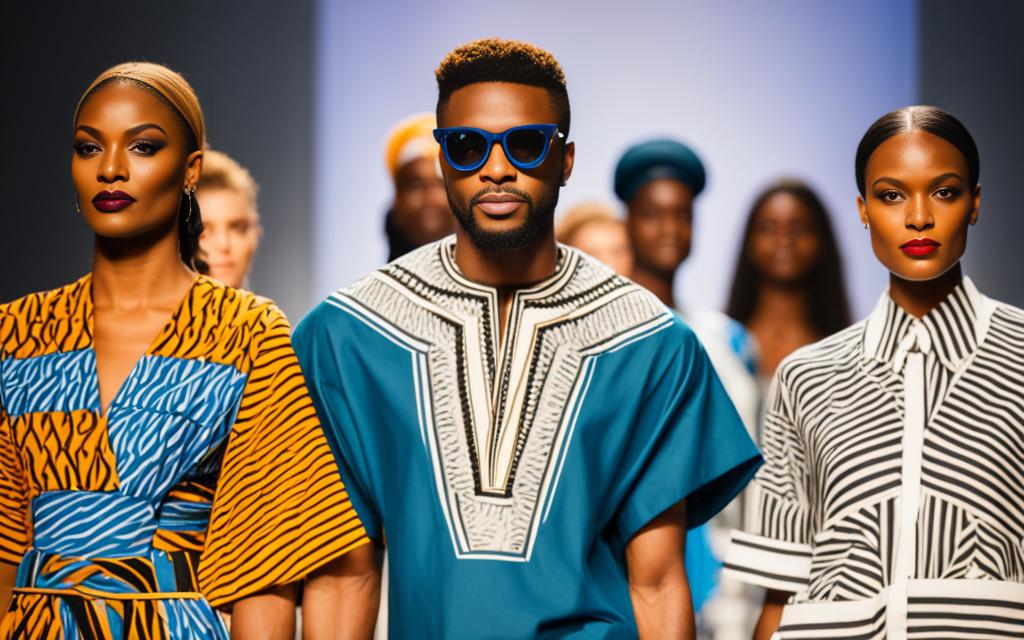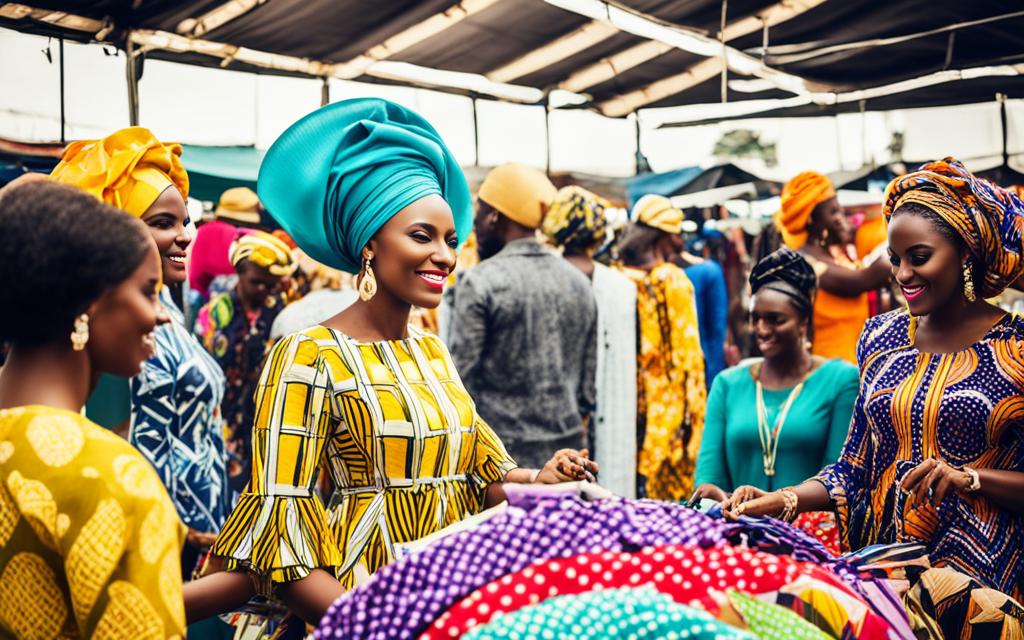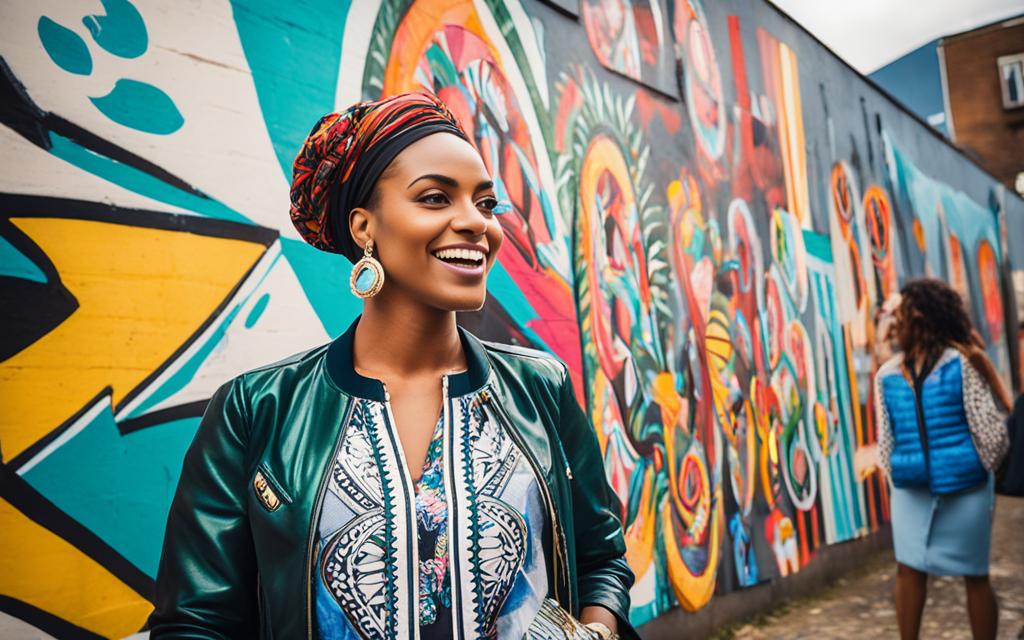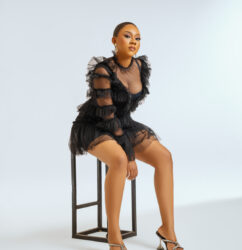Welcome to our article on the history of Nigerian fashion. We explore the journey of Nigerian fashion, highlighting the allure of traditional Nigerian clothing. Nigeria’s culture shines through its colourful and varied fashion. This country has a deep cultural history and its fashion has evolved greatly over time, mixing old and new styles.
Agbada and Dashiki represent the heart of Nigerian fashion’s past. They are known for their detailed work and high-quality materials. Agbada is a long robe with beautiful embroidery, usually crafted from special fabrics. Dashiki is a vibrant, loose top that became a symbol of African identity in the 1960s and 1970s.
Post-independence, Nigerian fashion embraced global influences and self-expression. Clothing styles moved from elegant dresses and hats in the ’60s to bold, modern looks in the ’90s. Each era contributed to the transformation of Nigerian fashion.
Today, Nigeria’s fashion industry celebrates the ingenuity of homegrown designers. People like Amaka Osakwe and Deola Sagoe mix tradition with modern trends successfully. They have put Nigeria on the global fashion map with their innovative designs.
From Lagos, the heart of fashion in Nigeria, comes a mix of old and new styles. Lagos Fashion Week, starting in 2011, has become an international stage for African fashion. It has helped Nigeria’s designers catch the eye of the world.
Nigerian fashion is a blend of its vibrant past and exciting future. With traditional and modern influences, Nigeria is creating a big impact in the fashion world. So, join us on this journey through the beautiful world of Nigerian fashion.
The Evolution of Nigerian Fashion Since Independence
Nigerian fashion has changed a lot since independence in the 1960s. It has picked up new trends while keeping its traditional touch. This mix makes Nigerian fashion unique.
In the 1960s, women wore long dresses and big hats showing elegance. Men, on the other hand, sported bright colours and daring patterns. This mix drew from Nigerians’ rich traditional textiles and added a modern flair.
The 1970s brought the ‘oleku’ style, uniting cultural identity with fashionable innovation. It was a significant step in blending tradition with modern fashion. This trend soon became a fashion statement.
The 1980s saw Nigerian fashion embracing global trends. Ladies wore maxi skirts and accessorised with chunky jewellery. This showed their confidence and desire for self-expression. It marked an era where Nigerians proudly showcased their individuality.
By the 1990s, Nigerian fashion started leaning towards American trends. Aso-ebi, where groups wear the same clothes at events, became a symbol of unity. It marked the beginning of a cultural renaissance, blending local and foreign inspirations.
Since 2000, Nigerian fashion has been on a journey of its own, mixing local arts with global styles. It has led to international recognition for Nigerian designers. This era showcases the world-class talent in Nigerian fashion.
Throughout its history, Nigerian fashion has shown the world the country’s creativity. From its early days to the present, Nigerian fashion blends tradition with innovation. This mix has captured the hearts of many around the world.
The Popularity of Ankara Fabrics
Ankara fabrics are at the heart of Nigerian fashion’s story. They symbolise the country’s rich culture and winning creativity. These patterns are now in traditional and modern garments, from agbada to stylish tops.
They are loved for how they connect tradition with contemporary fashion. Ankara fabrics can be seen in everyday wear, special outfits, and even on runways. People everywhere love to wear Ankara to show their cultural pride.
The Impact of Nigerian Fashion Influencers
Nigerian fashion influencers have made a big difference since the independence era. Their style and social media work have helped Nigerian fashion stand out globally. They work closely with local designers and attend fashion events to share Nigerian creativity with the world.
They have broken myths about African fashion and promoted the industry internationally. Their work has made Nigerian fashion a respected name worldwide. They are true advocates for the creativity found in Nigerian fashion.
“Nigerian fashion is a reflection of our rich cultural heritage and limitless creativity. It is a force to be reckoned with on the global fashion scene.” – Nigerian Fashion Influencer
Nigerian fashion influencers have done a great job in promoting Nigerian fashion. They’ve shown the world the depth and creativity of Nigerian fashion. Thanks to their efforts, the world sees Nigerian fashion as a global contender.
The Rise of Nigerian Fashion Designers
Nigerian fashion designers are now big players in the fashion world. They mix traditional and modern techniques to make their mark. Their work has a unique Nigerian flair that’s turned heads everywhere.
Leading Nigerian Fashion Designers
Amaka Osakwe is a big name in Nigerian fashion, known for starting Maki Oh. She’s celebrated for blending old Nigerian styles into new designs. Her work is often seen at top fashion events, showing she’s a true pioneer.

Then there’s Kenneth Ize, who’s all about bold colours and unique fabrics. His pieces are a cool mix of Nigerian tradition and modern style. His designs have wowed fashion fans across the globe.
Lisa Folawiyo shines by mixing bright Ankara prints with detailed designs. Her pieces are one of a kind and pay homage to Nigeria’s cultural roots.
Finally, Deola Sagoe’s elegant creations are well-loved. She’s famous for her detailed work and fine craftsmanship. Her designs have walked runways worldwide, earning high praise all around.
The Influence of Contemporary Nigerian Fashion
Contemporary Nigerian fashion designers have redefined the perception of African fashion on the global stage, showcasing the beauty and diversity of Nigerian culture through their creations.
These designers are changing the game by pairing old Nigerian elements with new styles. Their fresh approach to design has caught the eye of the fashion community worldwide. They’re challenging old ideas about African fashion and winning fans everywhere.
Lagos Fashion Week: A Platform for Nigerian Talent
Lagos Fashion Week has become synonymous with the celebration of Nigerian fashion and is a platform that showcases emerging and established Nigerian designers.
The Lagos Fashion Week has really put Nigerian fashion on the map. It’s a key event that lets designers from Nigeria show their work to the world. It helps them connect with big names in the industry. This event is boosting Nigeria’s fashion scene and making it a real hub for style.
| Nigerian Fashion Designers | Description |
|---|---|
| Amaka Osakwe | Founder of Maki Oh, known for unique blend of traditional and modern tailoring techniques. |
| Kenneth Ize | Innovative designer who combines fabrics and colors to create visually stunning pieces. |
| Lisa Folawiyo | Celebrates the cultural heritage of Nigeria through vibrant Ankara prints and embellishments. |
| Deola Sagoe | Elegant designs featuring intricate embroidery and exquisite craftsmanship. |
The Influence of Lagos on Nigerian Fashion
Lagos, Nigeria’s heart of culture and finance, is key in shaping its fashion. It’s known for its lively fashion, influencing trends across Nigeria. This makes Lagos a top city in Nigeria for fashion.
The people of Lagos love their local designers. They’ve made Lagos stand out for its unique fashion. By doing this, they’ve made Lagos a trendsetter in Africa’s fashion world.
“Lagos is a city that embraces diversity and celebrates individuality. This has created an environment where designers can experiment, push boundaries, and create bold and exciting fashion statements.” – Funmi Onabolu, Fashion Consultant
Glamoholic Apparel, a fashion store on Lagos’ Lekki Phase 1, has changed how people see fashion. It highlights local designers, offering their work to a global audience. This unique store has become fashion haven for those seeking something special.

The Rise of Lagos Fashion Week
Lagos Fashion Week started in 2011 and quickly became a big deal. It brings attention to Nigerian fashion from all over the world. This event is where Nigeria’s best fashion takes the stage.
At Lagos Fashion Week, designers get worldwide exposure. It’s put Lagos on the map as a place of new and creative fashion ideas.
The Global Impact
Lagos’ impact on fashion goes beyond Nigeria. Designers from Lagos are now famous worldwide. They mix African traditions with modern flair, intriguing the fashion world globally.
Designers like Lisa Folawiyo and Deola Sagoe have made Nigerian fashion important globally. They’ve opened doors for others to do the same.
The Future of Lagos Fashion
Lagos’ fashion is always growing and leading the way in Nigeria. It’s a place where new ideas and trends start. Lagos itself is a symbol of blending culture with innovation.
As a city that mixes ancient with new, Lagos will keep impacting fashion in Nigeria. Its unique approach ensures it will be a fashion centre for many years.
| Lagos Fashion Scene | Fashion in Lagos | Fashion Industry in Lagos |
|---|---|---|
| Diverse and trendsetting | Captivating and innovative | Thriving and influential |
| Influenced by local designers | Embraces tradition and modernity | Fosters creativity and innovation |
| Concept stores showcase local talent | Lagos Fashion Week as a premier event | Global recognition for Lagos-based designers |
| Continual evolution and trendsetting | Blend of tradition and modernity | Pioneering the future of Nigerian fashion |
The Blend of Traditional and Modern Fashion in Nigeria
In Nigeria, traditional and modern styles of clothing mix beautifully. This blend is seen in the way Nigerians wear both Western and Nigerian clothes. They create stylish outfits that also show off Nigeria’s rich culture.
Garments like the agbada and dashiki are key to Nigerian fashion. They’re mainly worn at cultural events and special times. Wearing these shows pride in Nigeria’s customs.
The agbada is a big, flowing gown worn mostly by men. It’s made with lavish fabrics and decorated with detailed embroidery. The dashiki, on the other hand, is a loose, bright shirt. It became popular in the 1960s and is still loved today as a symbol of African culture.
“The blend of traditional and modern styles allows Nigerians to pay homage to their heritage while embracing contemporary fashion trends.”
Alongside traditional clothing, Nigerians also wear Western clothes in their daily lives. These clothes are loved for their ease and can be worn everywhere. Combining these with Nigerian touches lets people celebrate their own sense of style.
This mix of old and new fashion lets Nigerians be both modern and proud of their culture. It shows how their fashion is always changing, with new ideas mixing with the old.

The Influence of Nigerian Fashion on the Global Stage
The mix of classic and new Nigerian fashion has reached the global fashion scene. Nigerian designers are impressing the world with their unique approach. Mixing traditional Nigerian style with modern ideas, they make clothes loved everywhere.
| Traditional Nigerian Fashion | Modern Nigerian Fashion |
|---|---|
| Rich in culture and history | Influenced by global fashion trends |
| Emphasizes traditional fabrics, patterns, and accessories | Utilizes a wide range of fabrics and materials |
| Worn for cultural events and special occasions | Suitable for everyday wear and professional settings |
| Symbolizes Nigerian heritage and identity | Reflects individual style and fashion preferences |
Conclusion
The story of Nigerian fashion shows its lively culture and creativity. For many years, fashion in Nigeria has changed from old clothes to new looks. This shows how the Nigerian fashion world keeps moving. You can see Nigeria’s culture in the detailed stitching of the agbada and the bright prints of the dashiki.
Nigerian fashion is famous around the world, thanks to skilled designers there. Designers like Amaka Osakwe from Maki Oh and Deola Sagoe mix old and new styles. Their work helps to show how Nigerian fashion matters globally.
Lagos, the heart of Nigerian fashion, has been very important. The city is full of life in fashion, with many designers and stores like Alara showing off Nigerian style. Lagos Fashion Week has made Nigeria more popular, bringing in visitors and helping the fashion community grow.
In Nigeria, fashion mixes old and new to show off its identity and style. People are proud to wear both their cultural clothes and modern trends. With such a deep history and a growing industry, Nigerian fashion will keep growing and finding success.

















